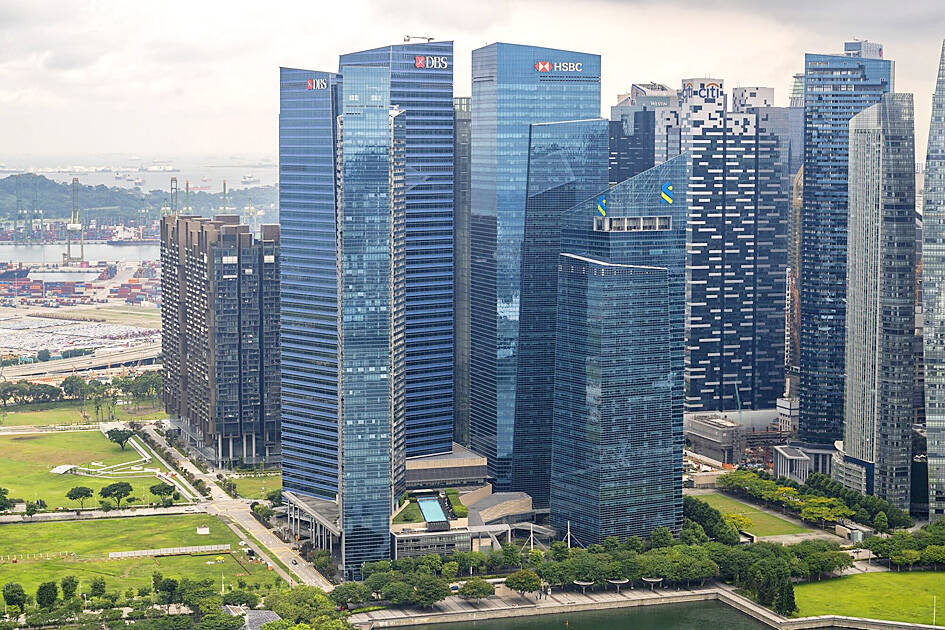Morgan Stanley aims to move to a new office in Singapore, seeking a bigger space in the financial district to accommodate its expansion.
The US firm is in advanced discussions for five floors at the upcoming IOI Central Boulevard Towers, which would give it certain signage rights, people familiar with the matter said.
The space, which would be able to house about 1,000 people, would cater to Morgan Stanley’s growing number of staff in Singapore, the people said, asking not to be named as the information is private.

Photo: Bloomberg
Morgan Stanley’s businesses across Southeast Asia have grown steadily, and it remains positive on the outlook for the region, a spokesman for the firm said.
He confirmed the plan to lease five floors at the new development from late next year, with the location to serve as the bank’s headquarters for Southeast Asia.
Representatives for the developer, Malaysia’s IOI Properties Group Bhd, did not reply to requests for comment.
Morgan Stanley’s expansion is being driven by growth in its fixed-income and wealth businesses, as well as an increase in technology and back-office employees, the people said.
The move to the Marina Bay area, next to the well-known Lau Pa Sat hawker center, would see it take up slightly more than 9,290m2 and move out of its current location, where it has been for more than 25 years, they said.
Global firms are boosting their presence in Singapore to manage or expand their Asian operations. A boom in private banking, family offices and other financial services during the COVID-19 pandemic has bolstered demand for swanky offices in the city-state’s central business district.
In April, the overall grade A vacancy rate in Singapore was 4.6 percent, data from Colliers International Group Inc showed.
That was much lower than Manhattan and Hong Kong.
Demand is likely to continue to come mainly from banking, insurance and financial services, Bloomberg Intelligence analysts wrote in a note last month.
Morgan Stanley would be sharing space at the new development with Amazon.com Inc.
The property comprises 117,058m2 of grade A office space, IOI Properties Group’s Web site says.
The new office would provide the New York-based bank with the latest technology infrastructure and flexible workplace design, the spokesman said.

When an apartment comes up for rent in Germany’s big cities, hundreds of prospective tenants often queue down the street to view it, but the acute shortage of affordable housing is getting scant attention ahead of today’s snap general election. “Housing is one of the main problems for people, but nobody talks about it, nobody takes it seriously,” said Andreas Ibel, president of Build Europe, an association representing housing developers. Migration and the sluggish economy top the list of voters’ concerns, but analysts say housing policy fails to break through as returns on investment take time to register, making the

‘SILVER LINING’: Although the news caused TSMC to fall on the local market, an analyst said that as tariffs are not set to go into effect until April, there is still time for negotiations US President Donald Trump on Tuesday said that he would likely impose tariffs on semiconductor, automobile and pharmaceutical imports of about 25 percent, with an announcement coming as soon as April 2 in a move that would represent a dramatic widening of the US leader’s trade war. “I probably will tell you that on April 2, but it’ll be in the neighborhood of 25 percent,” Trump told reporters at his Mar-a-Lago club when asked about his plan for auto tariffs. Asked about similar levies on pharmaceutical drugs and semiconductors, the president said that “it’ll be 25 percent and higher, and it’ll

CHIP BOOM: Revenue for the semiconductor industry is set to reach US$1 trillion by 2032, opening up opportunities for the chip pacakging and testing company, it said ASE Technology Holding Co (日月光投控), the world’s largest provider of outsourced semiconductor assembly and test (OSAT) services, yesterday launched a new advanced manufacturing facility in Penang, Malaysia, aiming to meet growing demand for emerging technologies such as generative artificial intelligence (AI) applications. The US$300 million facility is a critical step in expanding ASE’s global footprint, offering an alternative for customers from the US, Europe, Japan, South Korea and China to assemble and test chips outside of Taiwan amid efforts to diversify supply chains. The plant, the company’s fifth in Malaysia, is part of a strategic expansion plan that would more than triple

Taiwanese artificial intelligence (AI) server makers are expected to make major investments in Texas in May after US President Donald Trump’s first 100 days in office and amid his rising tariff threats, Taiwan Electrical and Electronic Manufacturers’ Association (TEEMA, 台灣電子電機公會) chairman Richard Lee (李詩欽) said yesterday. The association led a delegation of seven AI server manufacturers to Washington, as well as the US states of California, Texas and New Mexico, to discuss land and tax issues, as Taiwanese firms speed up their production plans in the US with many of them seeing Texas as their top option for investment, Lee said. The